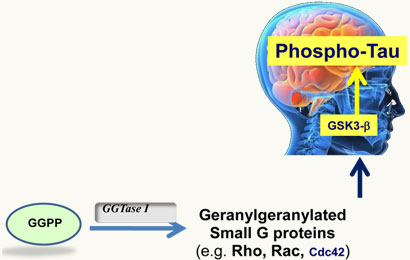Recent studies suggests that the expression of key enzymes in the mevalonate pathway is dysregulated in the brains of humans suffering from Alzheimer's diseases (AD).
An increase in the expression of the human enzyme geranylgeranyl pyrophosphate synthase (hGGPPS) has been observed. High intracellular levels of GGPP (the metabolic product of hGGPPS) is known to induce accumulation of phospho-Tau protein in the brain,
leading to the formation of neurofibrillary tangles (NFTs) and neuronal death. Accumulation of phospho-Tau in the brain is also strongly implicated in the onset and progression of Alzheimer's. Consequently, the development of therapeutic agents that inhibit hGGPPS activity may provide clinical benefits in arresting (or even preventing) the progression of Alzheimer's.
At the present time, the exploratory compounds that inhibit hGGPPS have not yet reached the stage of clinical development. Therefore, our goals are to (a) design molecular tools that would facilitate investigations into the role of prenylation in the progression Alzheimer's, and (b) design novel selective inhibitors of hGGPPS as pre-clinical candidates for the management or prevention of Alzheimer's.
Tsantrizos' Group
organic and medicinal chemistry
Phone : (514)398 3638
Fax : (514)398 3797
Email : youla.tsantrizos@mcgill.ca

